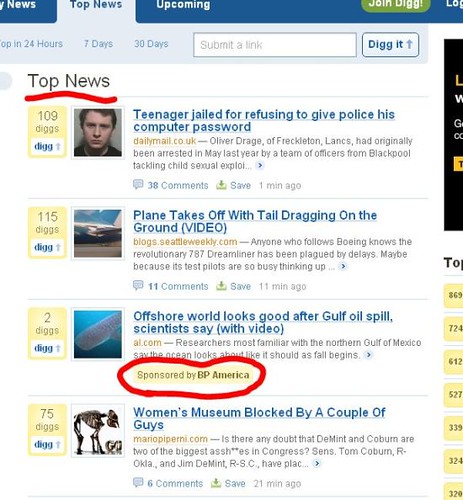There was some attention last week, to the fact that Digg had apparently allowed BP to step in as a sponsor on the site — and I do admit that, at a first pass, the image presented does not look good:

The article uses this example to suggest just how desperate Digg has become in the wake of its redesign, which resulted in many users revolting or going elsewhere. However, Chas Edwards from Digg, actually makes a pretty good point in responding to the article, in noting, first that the BP catastrophe is horrifying:
The deaths, the images of oil-soaked birds, and the enormous environmental and economic tragedy they symbolize, are deeply painful. For people above a certain age, they likely trigger traumatic memories of another gigantic and horrifying oil spill, when the captain and crew of the Exxon Valdez tanker crashed in waters off Alaska and spilled millions of gallons of oil into the ocean.
However, he then notes that the very same Atlantic article which mocks Digg for taking money from BP… happens to have been sponsored by Exxon:

Edwards points out that there are always issues in ad-supported media, but the mocking tone was unnecessary and somewhat hypocritical given The Atlantic’s own sponsorship practices.
At times, we’ve had the same sort of debate here. Do we take advertising money from companies we disagree with over certain things? There’s one argument that says that you should never agree to allow advertising from a company you disagree with. The flip-side might be that if a company you don’t like wants to give it’s money to you, perhaps you can put their money to much better use. In the end, I tend to view it in the same manner as I view censorship of unpopular speech: I’d rather let everything be out in the open, clearly stated, rather than trying to suppress views.
When I was in Germany recently, speaking at an event, a German guy in the audience got up and read aloud a comment on Techdirt that said less-than-nice things about Germans, and demanded to know why I had not deleted the comment (noting that, under German law, I was legally responsible for those comments). Beyond the ridiculousness of German law that puts the liability on third parties for others’ speech, I noted that free speech means allowing free speech for all — and if that includes ignorant speech, it’s better to let that ignorance out into the open where it can be countered and responded to, rather than trying to hide it and delete it. I said that blocking or simply deleting such speech only reinforces the ideas of those who make such speech that they’re saying something so “truthful” the world can’t bear to hear it. I don’t think that pushes the conversation forward.
Now, obviously, advertising is not the same kind of “speech” as discussed in the paragraph above, but there is something to be said for allowing companies to advertise in an open manner, and allowing the discussion to then occur, even about that advertising — something Digg tends to encourage openly. It’s been said that the best response to speech you don’t like isn’t censorship, but more speech — and I would argue that applies to advertising as well. Now, I’m sure some will cynically say that, of course anyone who accepts advertising will want to accept whatever ads they can to make money. But I think that sites like Digg, which have been pretty careful not to go down the road of really annoying advertising, show that they won’t just do anything for money.
Plenty of newspapers who covered the BP oil spill — including the NY Times, the Washington Post and the Wall Street Journal — all accepted advertising from BP in the wake of the spill. I didn’t see any sanctimonious articles condemning any of them for doing so. It may be tempting, at a gut level, to suggest this is somehow “wrong,” but I think I’d rather BP was out there trying to talk to people — and letting the people talk back — than being told it can’t spend its money that way at all.
Permalink | Comments | Email This Story
 LATEST NEWS
LATEST NEWS

